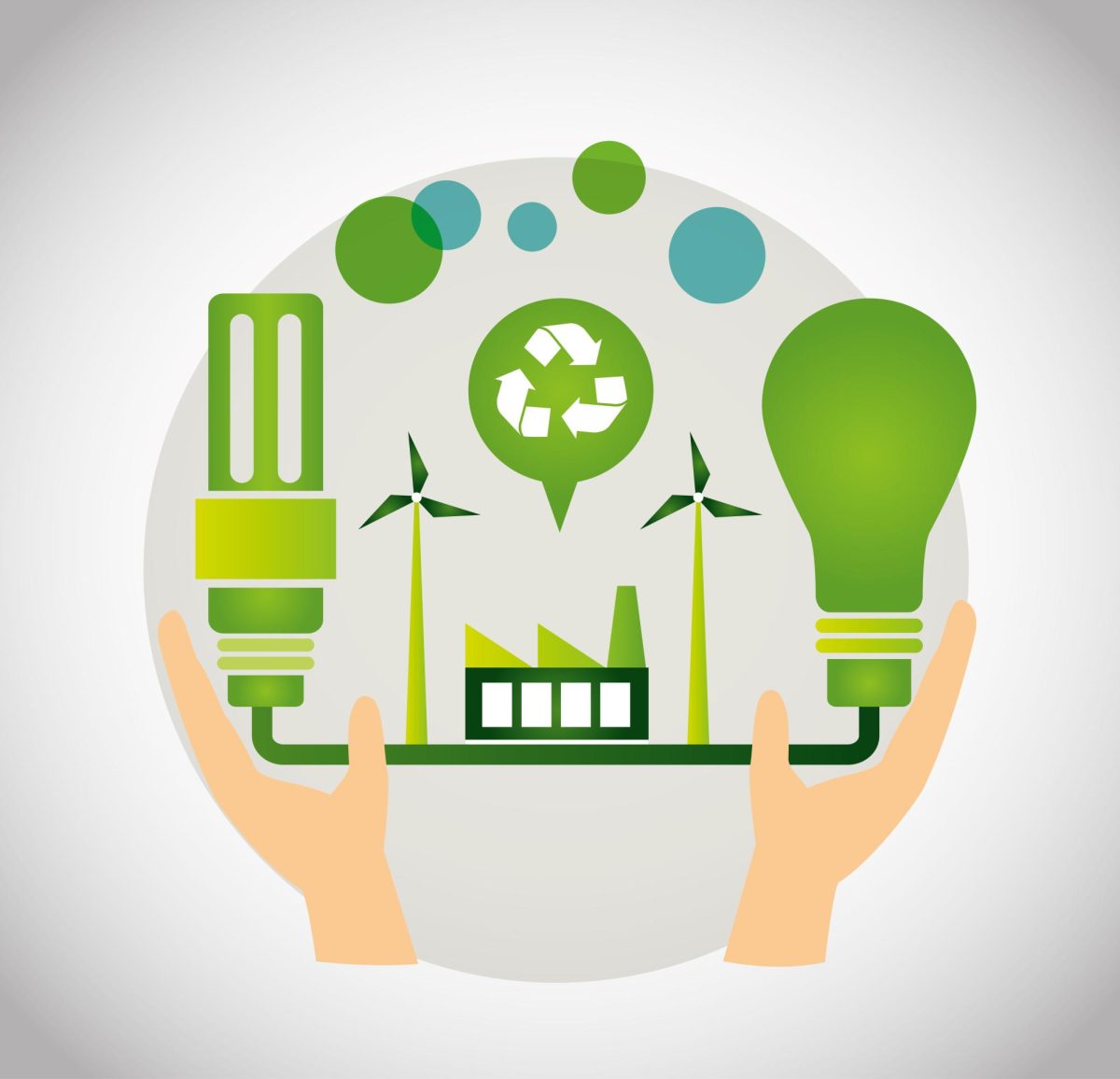Walking down the grocery aisle can feel overwhelming — every item fights for the customer’s attention with bold assertions and misleading claims about its supposed benefits. Similar advertisements on television and social media bombard consumers, pushing “all-natural” and “GMO-free” products. While these items claim to be healthy, they are often hiding harmful ingredients, like high-fructose corn syrup, under the claim that they’re technically natural.
Over the past few decades, corporations have adapted to an increasing demand for eco-friendly products with newly pervasive advertising tactics. While there are companies genuinely committed to sustainability, many brands falsely claim their products are eco-friendly, using buzzwords like “sustainable” or “clean.” This practice is known as “greenwashing,” where a company attempts to persuade consumers that a product is eco-friendly, usually to cover up the company’s unethical or environmentally damaging practices. Companies also often use biased or unreliable third-party verifiers to support bolder claims of sustainability. Despite their misleading promotions, companies seldom face repercussions for these strategies. Greenwashing exploits well-intentioned consumers searching for sustainable products, taking business away from actual eco-friendly brands. The Maryland and U.S. governments must create legislation that enforces stricter regulations against greenwashing and hold companies who engage in the practice accountable.
Before any legislation can be successful, the public must first be more aware of the dangers of greenwashing. Modern consumers generally prefer to buy a product with a label promoting sustainability than one without, with an overwhelming majority believing products and services containing information on their sustainability are useful. However, 53% of people said they could not distinguish between false and true green claims. Misleading advertising can be effective even when consumers know it is deceptive — consumers who detect false or misleading advertising are still more likely to develop positive feelings toward the brand, making them more likely to buy the product. Advertisements subconsciously convince people to buy a product by evoking certain emotions, clouding the consumer’s rational decision-making.
Greenwashing is especially prevalent in the food industry, which is responsible for about a third of human-caused greenhouse gas emissions. The meat and dairy industry emits the most greenhouse gas within the food sector, with beef alone producing 99.48 kilograms of carbon dioxide-equivalents per kilogram of food product. To greenwash their harmful environmental practices, meat and dairy companies often label their products as “humanely raised” or “natural.” The USDA doesn’t regulate these terms, giving companies free reign over the interpretation and use of them to advertise their products. For instance, companies sometimes label products as “natural” to seem sustainable while bypassing the comprehensive USDA certification required to use the “organic” label.
In 2021, the USDA took these low standards for labeling a step further, allowing beef producers to label their products as “low-carbon” or “climate-friendly” if they follow minimal sustainability guidelines which require producers to prove their production process emits ten percent fewer greenhouse gasses than the industry baseline. However, this benchmark doesn’t indicate below-average carbon dioxide emissions; some products with higher-than-average emissions can still qualify for the label, making the requirements effectively useless. Additionally, the vetting system allows companies to report their own calculations. As long as the USDA allows the biggest carbon emitters to make misleading claims without making any meaningful effort to lower their emissions, they’re allowing these companies to profit from the good intentions of eco-conscious consumers, much to the detriment of the planet.
Also guilty of greenwashing is the fashion industry. Fast fashion — cheaply produced clothes that capitalize on the latest fashion trends — pollutes bodies of water with plastic microfibers and depletes resources in developing countries. Huge fashion corporations like H&M and Zara claim — often without any third-party verification — that their products are sustainable or environmentally responsible, when in reality they’re only slightly better than normal. Without effective measures to slow down fashion production and a push for a circular economy — where textiles re-enter the economy after use instead of going to waste — the fashion industry can never be sustainable.
Companies also try to blame climate change and other environmental problems on the consumer. The idea of a personal “carbon footprint” — the sum of an individual’s carbon emissions — is possibly the most widespread example of companies shirking blame. Petrochemical giant BP — named the fiercest opponent of government climate change action in Europe — popularized the practice of calculating an individual’s carbon footprint as part of its 2004 to 2006 campaign to rebrand itself as “Beyond Petroleum.” This isn’t an inherently harmful idea, but BP’s ad campaign explicitly aimed to shift the blame from huge emitters onto individuals. While households contribute to at least 20% of total human-caused emissions in the U.S., companies are responsible for making unsustainable home products in the first place and lobbying against environmentally friendly legislation.
Despite BP’s supposed newfound commitment to sustainability, it continued its environmentally destructive practices. The infamous 2010 Deepwater Horizon oil rig explosion — which happened on one of their rigs — and the subsequent oil spill in the Gulf of Mexico was the largest environmental disaster in U.S. history and has had devastating consequences for local ecosystems. For its part in the disaster, BP faced criminal charges, including manslaughter and obstruction of Congress. The blatant hypocrisy of BP’s carbon footprint marketing campaign epitomizes the greenwashing crisis in all sectors, not just energy.
The ubiquity of greenwashing can make it difficult to discern who’s telling the truth and who’s not.
AP Environmental Science teacher Colleen Roots said her husband experienced greenwashing while shopping online for a phone case.
“My husband specifically chose a company that claimed to be eco-friendly and had eco-friendly packaging, but instead of coming in one shipment, it came in three separate shipments,” Roots said.
Roots said this was a blatant example of how companies can easily mislead well-intentioned consumers, even when consumers try to research a company’s sustainability practices online. Consumers can’t be expected to decipher the validity of green claims on every product they purchase or research the environmental impact of every company they buy from. To have a market based on consumer choice, the government needs to curb misleading advertising so consumers can make informed decisions.
The European Union is in the process of passing the “Green Claims Directive,” which would limit use of unsubstantiated, generic or otherwise misleading green claims. The proposed European legislation should inspire American politicians to protect their constituents from greenwashing. The power of corporate lobbyists in Congress makes passing similar legislation in the U.S. difficult, but not impossible.
Regulating the use of green claims is an important step forward, but it isn’t enough. As governments around the world crack down on greenwashing, more companies are turning to “greenhushing,” where they avoid making green claims and taking action to become more sustainable. The public needs to push its local representatives to enforce comprehensive regulations and incentives on the state and national levels to encourage companies to pursue real, impactful green initiatives.
















